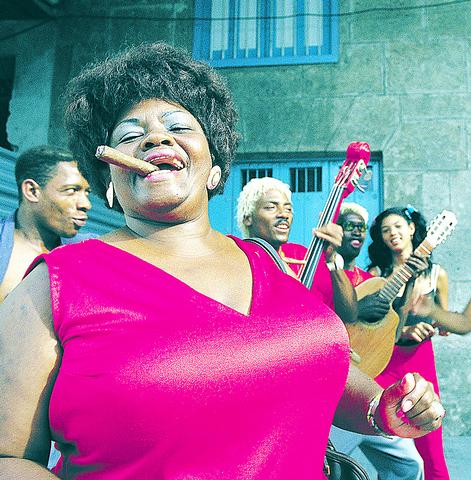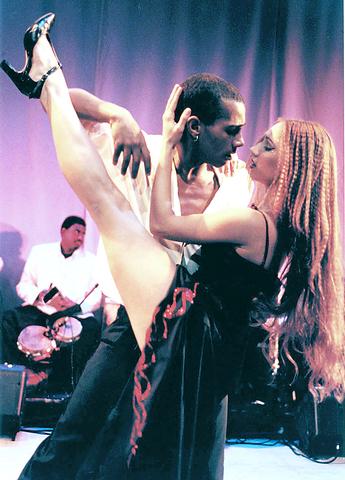With salsa music blasting into the streets round the clock and people sipping fruity rum-based cocktails in the shade, Havana is certainly not Taipei. And isn't that a shame? Well, at least we can pretend we're in Cuba this weekend when Lady Salsa comes to town.
This extravaganza of Cuban dance and music has spent the past year and a half in London and Havana under the direction of Englishman Toby Gough, turning up the heat in both places with its raucous, sexy performances. It's sure to do the same on its mini-tour of Taipei, Taichung, Tainan and Kaohsiung over the next week.
It's no secret that sex is one of the main ingredients in the Latin music phenomenon that's seduced the world in the past couple of years, and Lady Salsa lays on the sensuality thick and well-lubed. Ten marvelously sculpted dancers, wearing as little as possible, writhe about the stage eventually working up a sheen under intense red lights, moving to the entrancing rhythms of the Caribbean.

PHOTO COURTESY OF PARIS INTERNATIONAL
Subtlety is discarded and nothing is withheld, which is apparently an honest reflection of Cuban society in general, as Lady Salsa producer Jon Lee explains it. "The people in Cuba are fiery. One minute they'll be shouting at each other and the next it's like nothing was ever said. It's a very animated place."
For sure, the fascination with all things Latin, and especially Cuban, goes beyond the overt sexuality in the music and dance. There's also the sheer amount of musical creativity that emanates from the communist hold-out nation. The music, Lee says, is the main thrust of the show.
"Lady Salsa moves chronologically through the history of Cuban music, which is also basically a history of the country itself," Lee said by telephone from London.

PHOTOS COURTESY OF PARIS INTERNATIONAL
Cuba has benefited tremendously in the field of music from the mix of peoples that ended up populating the island. African beats and Spanish guitar, for example, make up the basic Cuban sound called son, which has formed the backbone for so many Latin styles of music, from salsa to chachacha to mambo.
Most of these musical forms emerged in the past century, as the cultures became more integrated and other influences, such as jazz from the US, began to filter in as a result of increased contact with the outside world.
The question mark hanging over the Taiwan performances is whether the bombastic Lady Salsa, who gives her name to the show, will turn up. She's 77 and, according to Lee, is slightly loathe to leave her native Cuba because of a threatening illness.
If she does come, she will add considerable weight to the performance, not only because she's a buxom 179cm tall (without her tall, red turban), but because she provides much of the soul of the show and her personal story largely mirrors that of her country.
When she was born in Cuba as Hilda Oates, the island was firmly in the grip of capitalist running dogs under whom her African heritage condemned her to the status of third-class citizen. The first part of her life was spent picking up scraps in the streets to make ends meet and to help her mother put food on the table and keep a roof over the family's heads. All that changed, though, with the communist uprising.
With little to lose, she signed up and started handing out pro-communist propaganda fliers in Havana. Eventually she got to meet Che Guevara and Fidel Castro, becoming one of their favorite performers as the uprising heated up. The tables had turned and the miserably poor servant girl was gracing stages for the heroes of the revolution.
Given this background, it's not surprising that she is a fervent supporter of the world's longest-serving dictator and in interviews has few nice things to say about Cuban exiles and escapees, referring to them as "thieves and criminals." This dramatic story is told by Oates herself in heavily accented, broken English while chewing on a fat cigar during the music and dance routines of Lady Salsa.
Even without her presence on stage, however, Lady Salsa is a particularly eye-popping performance thanks mainly to the sultry dancers, but also to the son band Sonora la Calle from Santiago de Cuba.
The performers also get the audience on their feet to test out their own pelvic thrusts and rump shaking. Don't worry if it all seems too risque, though. The performance has gotten the stamp of approval from Cuba's Ministry of Ideology, no joke.

On April 26, The Lancet published a letter from two doctors at Taichung-based China Medical University Hospital (CMUH) warning that “Taiwan’s Health Care System is on the Brink of Collapse.” The authors said that “Years of policy inaction and mismanagement of resources have led to the National Health Insurance system operating under unsustainable conditions.” The pushback was immediate. Errors in the paper were quickly identified and publicized, to discredit the authors (the hospital apologized). CNA reported that CMUH said the letter described Taiwan in 2021 as having 62 nurses per 10,000 people, when the correct number was 78 nurses per 10,000

As we live longer, our risk of cognitive impairment is increasing. How can we delay the onset of symptoms? Do we have to give up every indulgence or can small changes make a difference? We asked neurologists for tips on how to keep our brains healthy for life. TAKE CARE OF YOUR HEALTH “All of the sensible things that apply to bodily health apply to brain health,” says Suzanne O’Sullivan, a consultant in neurology at the National Hospital for Neurology and Neurosurgery in London, and the author of The Age of Diagnosis. “When you’re 20, you can get away with absolute

May 5 to May 11 What started out as friction between Taiwanese students at Taichung First High School and a Japanese head cook escalated dramatically over the first two weeks of May 1927. It began on April 30 when the cook’s wife knew that lotus starch used in that night’s dinner had rat feces in it, but failed to inform staff until the meal was already prepared. The students believed that her silence was intentional, and filed a complaint. The school’s Japanese administrators sided with the cook’s family, dismissing the students as troublemakers and clamping down on their freedoms — with

As Donald Trump’s executive order in March led to the shuttering of Voice of America (VOA) — the global broadcaster whose roots date back to the fight against Nazi propaganda — he quickly attracted support from figures not used to aligning themselves with any US administration. Trump had ordered the US Agency for Global Media, the federal agency that funds VOA and other groups promoting independent journalism overseas, to be “eliminated to the maximum extent consistent with applicable law.” The decision suddenly halted programming in 49 languages to more than 425 million people. In Moscow, Margarita Simonyan, the hardline editor-in-chief of the